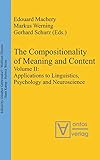The Compositionality of Meaning and Content. Volume II, Applications to Linguistics, Psychology and Neuroscience / ed. by Markus Werning.
Material type: TextSeries: Linguistics & Philosophy ; 2Publisher: Berlin ; Boston : De Gruyter, [2013]Copyright date: ©2005Description: 1 online resource (312 p.)Content type:
TextSeries: Linguistics & Philosophy ; 2Publisher: Berlin ; Boston : De Gruyter, [2013]Copyright date: ©2005Description: 1 online resource (312 p.)Content type: - 9783110332759
- 9783110332865
- 410 23
- P325.5.C626 G74 2013eb
- online - DeGruyter
- Issued also in print.
| Item type | Current library | Call number | URL | Status | Notes | Barcode | |
|---|---|---|---|---|---|---|---|
 eBook
eBook
|
Biblioteca "Angelicum" Pont. Univ. S.Tommaso d'Aquino Nuvola online | online - DeGruyter (Browse shelf(Opens below)) | Online access | Not for loan (Accesso limitato) | Accesso per gli utenti autorizzati / Access for authorized users | (dgr)9783110332865 |
Frontmatter -- Contents -- Preface -- Part I COMPOSITIONALITY AND LANGUAGE -- Compositionality, Linguistic Evolution, and Induction by Minimum Description Length -- Compositionality and Molecularism -- Compositionality, Aberrant Sentences and Unfamiliar Situations -- Challenging the Principle of Compositionality in Interpreting Natural Language Texts -- Compositionality in Plant Fixed Expressions -- Type- and Token-Level Composition -- Compositionality and Contextuality as Adjoint Principles -- Part II COMPOSITIONALITY AND THE MIND -- Perspectives, Compositionality and Complex Concepts -- Compositionality and the Pragmatics of Conceptual Combination -- The Goldilocks Scenario: Is Noun-noun Compounding Compositional? -- Structured Thoughts: The Spatial-Motor View -- Part III COMPOSITIONALITY AND THE BRAIN -- Learning Representations: How Stochastic Models Compose the World -- Neural Architectures of Compositionality -- Neuronal Synchronization, Covariation, and Compositional Representation
restricted access online access with authorization star
http://purl.org/coar/access_right/c_16ec
The second volume is devoted to issues of compositionality that arouse in the sciences of language, the investigation of the mind, and the modeling of representational brain functions. How could compositional languages evolve? How many sentences are needed to learn a compositional language? How does compositionality relate to the interpretation of texts, the generation of idioms and metaphors, and the understanding of aberrant expressions? What psychological mechanism underlies the combination of complex concepts? And finally, what neuronal structure can possibly realize a compositional system of mental representations?
Issued also in print.
Mode of access: Internet via World Wide Web.
In English.
Description based on online resource; title from PDF title page (publisher's Web site, viewed 28. Feb 2023)


